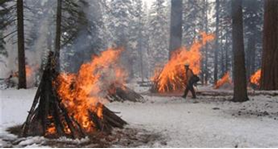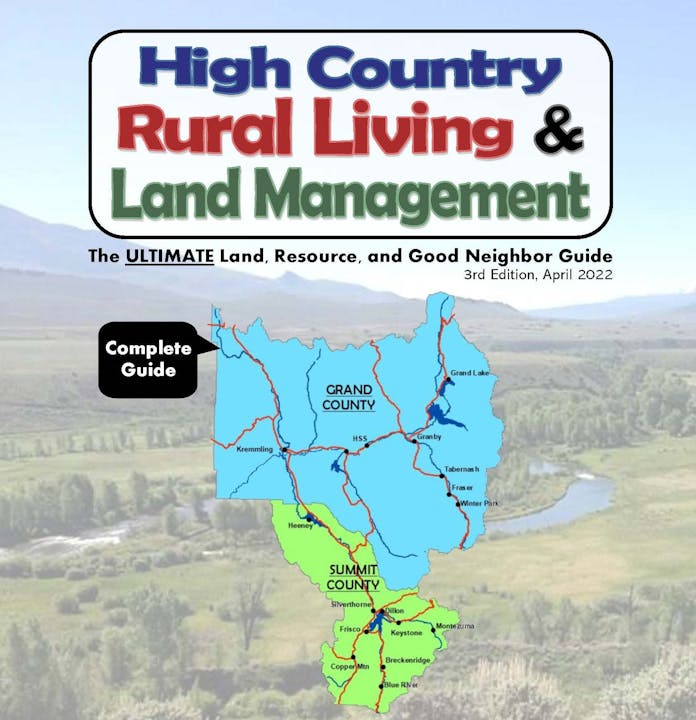Open Burning
Open Burning (Slash Pile Burning)

Slash pile burning can be an effective way to remove woody debris and mitigate for future wildfires if done properly, performed during the correct time of year, and executed under the purview of an approved permit. For health and safety reasons, slash pile burning is subject to open burning regulations and REQUIRES that a burn permit be obtained prior to burning activities.
In Grand County,
Grand County Natural Resources (GCNR) regulates the burning of slash piles larger than campfire-size (3 feet in diameter by 2 feet high) on private lands. GCNR does not permit burning of any other materials besides slash piles. Individuals looking for Demolition permits should contact the Planning & Zoning Department. The burn season opens in Grand County when there is sufficient, season-long snow on the ground and generally runs until April 1, depending on snowpack. Burning is not guaranteed on any given day during the burn season. Burn permit holders MUST call GCNR on day of the proposed burn to see if weather and air quality conditions allow for burning. Contact info in "Who You Gonna Call" on the right. You can also see where burning is occurring on a daily basis by going to co.grand.co.us/142/open-burning and clicking on the “Daily Burn List.”
In Summit County,
The two fire districts (Red, White and Blue / Summit Fire and EMS) regulate backyard slash pile and recreational campfire burning. Summit County Environmental Health Department (EHD) regulates burning of larger slash piles (greater than 8 feet in size). Please contact the appropriate Fire District or Summit County EHD for more information. Contact info in "Who You Gonna Call" on the right.
Additional Open Burning Resources: Colorado Pile Construction Guide | Colorado Open Burning FAQ
Exemptions to Obtaining Open Burning Permits
Per the Colorado Air Quality Control Commission Regulation 9, III(B), certain burning activities are exempt from requirements to obtain an open burning permit. Nothing in this regulation, however, is to be construed as relieving any person conducting open burning from meeting the requirements of any applicable federal, state or local requirements concerning disposal of waste materials. Furthermore, all necessary safeguards shall be utilized during such “exempt” open burning to minimize any public health or welfare impacts. The owner or operator shall also take steps to ensure that all neighboring residents and businesses are notified prior to beginning the open burn.
Agricultural Burning
Land zoned as “agriculture” does NOT automatically provide exemption from the open burn permitting process. Agricultural burning is defined as “the burning of cover vegetation for the purpose of preparing the soil for crop production, weed control as part of a larger agricultural purpose, maintenance of water conveyance structures related to agricultural operations, and other agricultural cultivation purposes.” If a rancher or farmer wishes to burn something not specified for exemption in the “agricultural burning” definition, he/she must apply for an Open Burn Permit. Calls to your local County Dispatch Center on the day of the ag burn are required, and courtesy calls to neighboring landowners are strongly recommended.
Even though agricultural burns may be “legal” on any given day, except when local Fire Restrictions are in effect, caution should be taken when conditions are dry. Seemingly small and controlled “ditch” burns may become uncontrollable wildfires in a short period of time.
Outdoor Recreational Fires (if fire restrictions are not in effect):
Attended recreational fires are exempted if they are:
- Within liquid or gas fueled stoves
- Located in self-contained charcoal grills (off the ground)
- Outdoor fires, not in excess of 3 feet in diameter and 2 feet in height, contained in an outdoor fireplace, barbeque grill, barbeque pit, fire pit or grate located on private land or in developed picnic grounds/campgrounds with adequate fire suppression equipment present.
NOTE: Summit County has stricter policies than listed here for Outdoor Recreational Fires.
- Under a fire-code amendment adopted by the Summit County Commissioners and each of the town councils, a permit is REQUIRED for all recreational (a.k.a. “backyard”) campfires in Summit County. This includes campfires on private lands.
- Residents of the Red, White & Blue Fire Protection District, which includes all areas south of Farmer’s Korner, including Breckenridge and Blue River may apply for a permit with Red, White & Blue Fire.
- Residents of the Summit Fire & EMS response area (Copper, Dillon, Frisco, Keystone, Montezuma, Summit Cove, Silverthorne, Wildernest/Mesa Cortina and the lower Blue Valley) may apply for a permit from Summit Fire & EMS.
Materials for which Burning is NEVER Allowed
- Burning of food waste, plastic, coated or treated wood products, rubber, insulation, tires, car bodies, insulated wire, motor oil, aerosol cans, hazardous or toxic materials, or other materials that will produce substantial amounts of smoke and particulates.
- Burning of wood residue, which includes bark, sawdust, slabs, chips, shavings, mill trim, and other wood products derived from wood processing.
- Burning of construction debris (includes both clean and treated wood).
- Burning of buildings or structures for demolition purposes.
- Burning of material for which a practical alternative method of disposal exists.
- BURN BARRELS: It is against the law to use burn barrels because they are considered incinerators that require construction permits and are subject to federal and state testing and regulations.
References
- Grand County Natural Resources. Open Burning. https://co.grand.co.us/142/Open-Burning
- Air Pollution Control Division. Open Burning FAQ. https://drive.google.com/file/d/1DRC7bOlluQ_gKqRDefyM0DMu9aWcEslM/view
- Air Pollution Control Division. Agriculture Burning. https://drive.google.com/file/d/1lqONRM5rc94eHG5e2jK0tAOhzO2bWJjz/view

